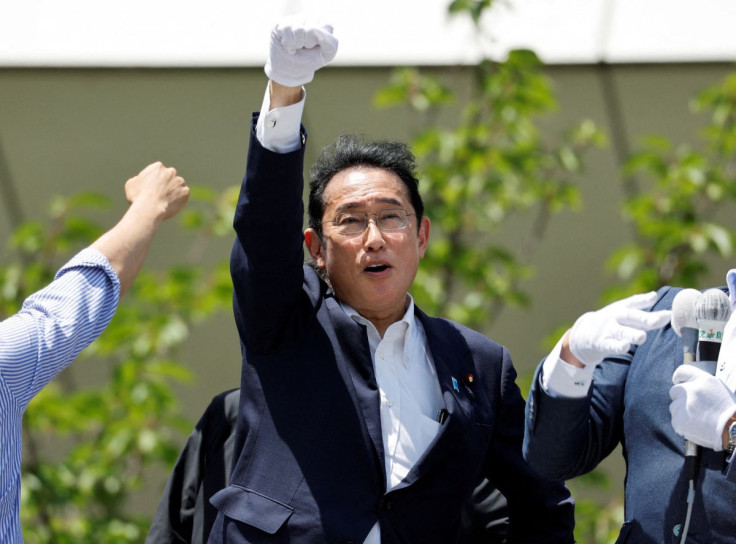Kishida Looks Forward To Polls To Change Japan’s Pacifist Constitution

Though the upper house elections are seen as an interim report card on a government's performance in Japan, the July 10 polls will have implications for Prime Minister Fumio Kishida and his ruling Liberal Democratic Party’s (LDP) ability to push through vital legislation, including amendments to the famous pacifist constitution.
As the upper house is the less powerful of the country’s parliament's two chambers, a landslide victory for the LDP could help Kishida consolidate control over the party for another three years before the next elections are held in 2025.
A setback in the elections, however, could expose Kishida and his nine months old government to challenges from rivals and disgruntled groups within the LDP.
A survey by public broadcaster NHK showed that 35.6 percent of voters supported the LDP against 5.8 percent managed by the largest opposition Constitutional Democratic Party of Japan.
A total of 125 seats will be up for grabs on July 10 who will serve for six years in the 245-seat upper house. After the polls, the number of seats will be increased by three to make it 248.
The polls will take place as Japan is gradually easing the COVID-19 curbs. After a two-year hiatus, the country has started to accept foreign tourists.
The main opposition Constitutional Democratic Party of Japan has blamed the government for its lack of steps to ease the impact of rising prices on households. The party has termed the current impasse as "Kishida inflation."
Sixty-four-year-old Kishida, who serves as head of the LDP, has dismissed the view, saying that inflation is being caused by the Russian invasion and the surge in global commodity prices.
The LDP is plagued by a scandal involving a lower house member, Takeru Yoshikawa, who quit the party recently as he went out for drinks with a girl aged 18, which is below the legal drinking age in the country.
As far as voters are concerned, rising prices are the key issue due to a weak yen that has driven up fuel, electricity and food prices. A weak yen has boosted import costs for resource-poor Japan.
The government has doled out 2.7 trillion yen ($20 billion) in the extra budget to soften the impact of the increasing oil prices.
Amendments to the U.S.-drafted 75-year-old pacifist constitution require approval by two-thirds of each chamber of parliament. Though Kishida has not hinted at how much the government is planning to increase the defense budget, it has been allocated 5.4 trillion yen, less than a quarter of what China spends, this fiscal year.
In its election manifesto, the LDP has called for an increase in defense spending up to 2 percent of GDP, which would make Japan on par with the minimum level North Atlantic Treaty Organization (NATO) members have pledged to spend on defense.
On June 29, Kishida became the first Japanese prime minister to attend a NATO summit where he reiterated more Japanese support for NATO.
On the sidelines of the NATO summit, Kishida also met South Korean President Yoon Suk Yeol and discussed the North Korean threat.
The government's response to Russia's invasion of Ukraine, a rising China, and the North Korean missile and nuclear threats are the main issues on the diplomatic front.
To the solace of the LDP, opinion polls show two-thirds of voters support increasing military spending. Revising Article 9 of the constitution, which bans the use of force to settle disputes, has long been on the agenda of the LDP, which claims the U.S.-drafted document is out of touch with today's geopolitical realities. To change the pacifist constitution, approval by a two-thirds majority in both houses is required.
In contrast to the high interest among the elderly, the turnout has been particularly low among younger voters in recent elections in a rapidly aging society.
Mainly due to the limited presence of women in political leadership, Japan was ranked 120th in the World Economic Forum's global gender gap report last year. Few believe that the July 10 polls to elect the Diet’s House of Councillors will be an exception to this.
Currently, 23 percent of Japan's Upper House members are women. It's the lowest among the Group of Seven nations. In Canada, more than 49 percent of Senate members are females, Germany's upper house has 36 percent, while in France, women lawmakers account for 34 percent.
This time, there are a record 181 women trying their luck this time, accounting for 33 percent of all candidates in the 124 million East Asian country.
But since most of the female candidates are the flag-bearers of opposition parties, it will be hard for them to dent Japan’s male-dominated political landscape.
























